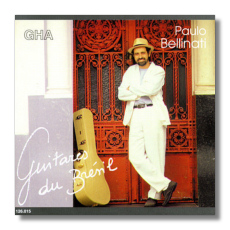
The Internet's Premier Classical Music Source
Related Links
- Latest Reviews
- More Reviews
-
By Composer
-
Collections
DVD & Blu-ray
Books
Concert Reviews
Articles/Interviews
Software
Audio
Search Amazon
Recommended Links
Site News
 CD Review
CD Review
Paulo Bellinati

Guitares du Brésil
- Pulo do gato
- Cabra cega
- A furiosa
- Um amor de valsa
- Lun-duo
- Valsa brilhante
- Modinha
- Lenço atras
- Jongo
- Baiao de gude
Paulo Bellinati, guitars
GHA 126.015 Time: 39:46
Classical music is, by and large, a celebration of the dead, so it's quite a relief to review music by a living person. And it's an added pleasure to have the composer's own take on the music. Except for one track with guest Cristina Azuma, Paulo Bellinati is everywhere, heard solo and multi-tracked on five different Brazilian guitars (besides the standard six-string).
Guitares du Brésil celebrates a wide range of native styles, each betraying its own ethnic origin: lundu, a rural folk dance, retains an African strain, while the urban maxixe fuses the lundu with the Latin tango. These guitar renditions are transcriptions, with Bellinati playing all the parts of the ensemble or choro; including percussion, which he taps out on the belly of his instrument. The variety of voices and timbres is fascinating. A five-course, double stringed guitar, viola caipira, sounds akin to a sitar. It is heard on "Cabra cega," a tune that has an air of the Beatles' "Dear Prudence." Much of Bellinati's work sounds jazz inflected, but he is never predictable. He is also at home with the Baroque (the free toccata of the "Valsa brilhante" is stirring); the "Modinha," a sentimental confection of the Brazilian salon, echoes the Chopin Étude Op. 25, #7 with its moonlit swoon. Though I have heard the guitar played faster and with more abandon, Bellinati's playing is technically assured throughout, and always with impeccable style and grace.
The brief booklet shows the smiling artist posing with each instrument. That he wears a different hat in each picture will not be lost on the listener - he seems to have the knack for every instrument and every style.
Copyright © 1997, Robert J. Sullivan


















